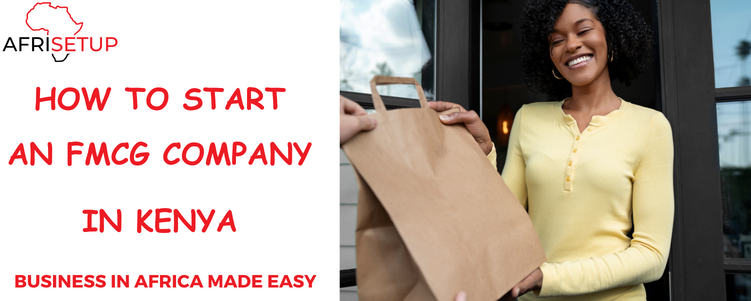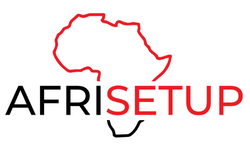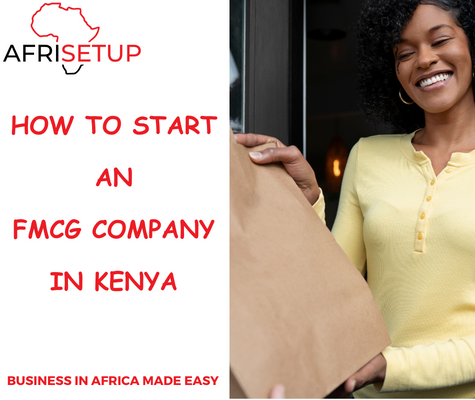- By afrisetupconsultants
- Uncategorized
- 0 Comment
Start an FMCG company in Kenya – The fastmoving consumer goods FMCG industry in Kenya plays a crucial role in the nation’s economy, driven by products known for their quick turnover and high demand, essential for daily living. This sector encompasses a wide array of goods ranging from food, beverages, personal care items, household products, to pharmaceuticals.
In Kenya’s FMCG sector, competition is fierce, characterized by the presence of both multinational corporations such as Unilever, Procter & Gamble, Coca-Cola, Nestlé, PepsiCo, as well as domestic brands and manufacturers.
If you are looking to start an FMCG company in Kenya, Afrisetup is your trusted partner for a seamless company registration in Kenya. We specialize in guiding business owners through every step, ensuring your company is fully registered and compliant with Kenyan regulations. With Afrisetup, you can focus on building your brand while we handle the paperwork. Reach out to us today to kickstart your FMCG business in Kenya with confidence.

List of FMCG distributors in Kenya
As you plan to start an FMCG company in Kenya, it is important to familiarize yourself with some of the FMCG distributors in the country. Here is a list of FMCG distributors in Kenya:
ü Mahitaji Enterprises Ltd
ü Munira Wholesalers & Retail
ü Best Buy Commodities L
ü Zenko Kenya Limited
ü Raisons Distributors Limited
ü Bowip Agencies Ltd
N|B – When it comes to FMCG distributor sourcing in Kenya, don’t stress yourself. We have a specialized team of professionals who will help you find the right distributor for your products in Kenya.
Top FMCG companies in Kenya | Top Manufacturers of Fast Moving Consumer Goods in Kenya
Before you start an FMCG company in Kenya, gaining insights into the top players in the market can be immensely valuable. By understanding the tricks and tips they’ve employed, you can position your brand for greater competitiveness. Here is a list of some of the top FMCG manufacturing companies in Kenya:
Ø Unilever: Unilever is a multinational consumer goods company with a significant presence in Kenya, offering a wide range of products in categories such as personal care, home care, and food and beverages.
Ø Coca-Cola: Coca-Cola is a leading beverage company in Kenya, known for its iconic soft drink brands as well as a diverse portfolio of other non-alcoholic beverages.
Ø East African Breweries Limited (EABL): EABL is a major player in the alcoholic beverage industry in Kenya, producing and distributing beer, spirits, and non-alcoholic beverages.
Ø Procter & Gamble: Procter & Gamble is a global consumer goods corporation with operations in Kenya, offering products in categories such as personal care, home care, and grooming.
Ø Kenya Wine Agencies Limited (KWAL): KWAL is a leading producer and distributor of wines, spirits, and non-alcoholic beverages in Kenya, catering to both local and international markets.
Ø British American Tobacco: British American Tobacco (BAT) is a leading tobacco company in Kenya, manufacturing and distributing tobacco products such as cigarettes and cigars.
Ø Bidco Africa: Bidco Africa is a major manufacturer and distributor of consumer products in Kenya, specializing in edible oils, fats, hygiene, and personal care products.
Ø Heineken: Heineken is a renowned international brewing company with a presence in Kenya, offering a variety of beer brands to consumers in the country.
Ø TATA Chemicals: TATA Chemicals is involved in the production and distribution of chemicals, fertilizers, and consumer products in Kenya, contributing to various sectors including agriculture and consumer goods.
Ø Brookside Dairy Limited: Brookside is a leading dairy company in Kenya, known for its production and distribution of milk and dairy products, including yogurt, cheese, and butter.
Contact us today for more details on the FMCG players in Kenya
FMCG products in Kenya | Key Facts
These include maize flour, essential for Ugali, a staple food; milk for tea and beverages; bread, often consumed with milk; vegetables like kales and spinach; washing detergents and soaps for household cleaning; popular alcoholic drinks like Blue Moon and Legend Brandy; beauty products, particularly favored by women; fast foods like burgers and pizzas; sanitary items such as tissues and pads; stationery like pens and notebooks; and cooking oil and salt, which complement staple foods such as maize flour and vegetables.
N|B – As you start an FMCG company in Kenya, please consider the products listed above, which are known to be in high demand.
Steps to start a FMCG company in Kenya
Starting an FMCG company in Kenya involves several key steps:
1. Market Research: Conduct thorough market research to identify consumer needs, preferences, and market trends in Kenya’s FMCG sector.
2. Business Plan: Develop a comprehensive business plan outlining your company’s objectives, target market, product offerings, distribution channels, marketing strategies, and financial projections.
3. Legal Registration: Register your FMCG company with the relevant government authorities, including the Registrar of Companies, to obtain the necessary licenses and permits for operating legally in Kenya.
4. Product Development: Develop or source high-quality FMCG products that meet consumer demands and preferences. Consider factors such as packaging, branding, and pricing to differentiate your products in the market.
5. Supply Chain Management: Establish robust supply chain management processes to ensure timely procurement, production, and distribution of FMCG products to retailers and consumers.
6. Distribution Network: Build a strong distribution network by partnering with wholesalers, distributors, retailers, and supermarkets to reach consumers across urban and rural areas effectively.
7. Marketing and Branding: Implement marketing strategies to promote your FMCG products and build brand awareness. Utilize various channels such as advertising, social media, promotions, and point-of-sale displays to attract customers.
8. Quality Assurance: Implement quality control measures to ensure the consistency, safety, and compliance of your FMCG products with regulatory standards and customer expectations.
9. Financial Management: Manage your finances efficiently by budgeting for startup costs, operational expenses, inventory management, and cash flow management to sustain and grow your FMCG business.
10. Compliance and Regulations: Stay informed about regulatory requirements and industry standards governing the FMCG sector in Kenya. Ensure compliance with laws related to product labeling, packaging, taxation, and health and safety standards.
By following these steps, you can lay the groundwork for establishing a successful FMCG company in Kenya and capitalize on the opportunities within the fast-paced consumer goods market. Start an FMCG company in Kenya today with our assistance. Click here to speak to an expert
Advantages of starting a FMCG company in Kenya
When you start an FMCG company in Kenya, you will enjoy the following benefits:
§ Growing Market: Kenya’s FMCG market is expanding rapidly due to population growth, urbanization, and rising disposable incomes, providing ample opportunities for new entrants.
§ Diverse Consumer Base: Kenya’s diverse population with varied preferences and lifestyles creates a demand for a wide range of FMCG products, allowing for niche targeting and market segmentation.
§ Favorable Economic Environment: Kenya has a relatively stable economy and business-friendly policies, encouraging entrepreneurship and investment in the FMCG sector.
§ Strategic Location: Kenya serves as a gateway to the East African region, offering access to neighboring markets through trade agreements and regional integration initiatives, enhancing market reach and export potential.
§ Innovation and Adaptability: The dynamic nature of the FMCG industry encourages innovation and adaptation to changing consumer trends, providing opportunities for new products and brands to enter the market.
§ Strong Distribution Networks: Kenya has a well-established network of wholesalers, distributors, and retailers, facilitating efficient distribution and market penetration for FMCG companies.
Click here to speak to an FMCG expert in Kenya
FAQS
1.What are FMCG products? bread, milk, tea, sugar, cooking oil, soft drinks, snacks, and packaged foods, toothpaste, skincare products, deodorants, and cosmetics. Household products: Including cleaning agents like detergents, dishwashing liquid.
2.How can I finance my FMCG startup in Kenya? An efficient strategy for funding your FMCG startup in Kenya involves a mix of personal savings, contributions from family and friends, and seeking potential government grants or entrepreneurial support programs. Initiate the process by utilizing your own savings as a demonstration of your dedication to your business concept.
3.What are the key factors to consider when starting an FMCG company in Kenya? Some key factors to consider before you start a manufacturing company
Before you start an FMCG company in Kenya, do thorough market research, understanding consumer behavior, and identifying market gaps are crucial for product development and marketing strategies. Establishing efficient supply chains, competitive pricing strategies, and strong branding are essential for attracting customers and fostering loyalty. Prioritizing product quality and regulatory compliance builds trust among consumers. Overall, meticulous planning, market insight, and product quality are vital for FMCG company success.
4.What are the regulatory requirements for FMCG companies in Kenya?
FMCG companies in Kenya must comply with regulatory requirements set by agencies such as KEBS, covering product registration, labeling, and packaging standards. They also need to adhere to health and safety regulations, advertising standards, tax compliance, import/export regulations, environmental laws, and employment regulations to ensure legal and ethical operations.
5.How big is the FMCG market in Kenya? FMCG market in Kenya is large, driven by consumer demand for essential goods and services, with sales estimated at billions of dollars annually.
6.What are the 3 major segments of FMCG industry?
The three major segments of the FMCG (Fast Moving Consumer Goods) industry are food and beverages, personal care products, and household products.
7.What is the trend in FMCG in Kenya? Dynamic.
Conclusion
Starting an FMCG company in Kenya presents exciting opportunities for aspiring entrepreneurs to tap into a dynamic and growing market. By following the steps outlined in this guide and leveraging industry best practices, you can set yourself up for success and build a thriving FMCG business that meets the needs of Kenyan consumers. Embrace innovation, stay adaptable, and always prioritize delivering value to your customers to unlock the full potential of your FMCG venture. Contact us today to start an FMCG company in Kenya hassle-free.

